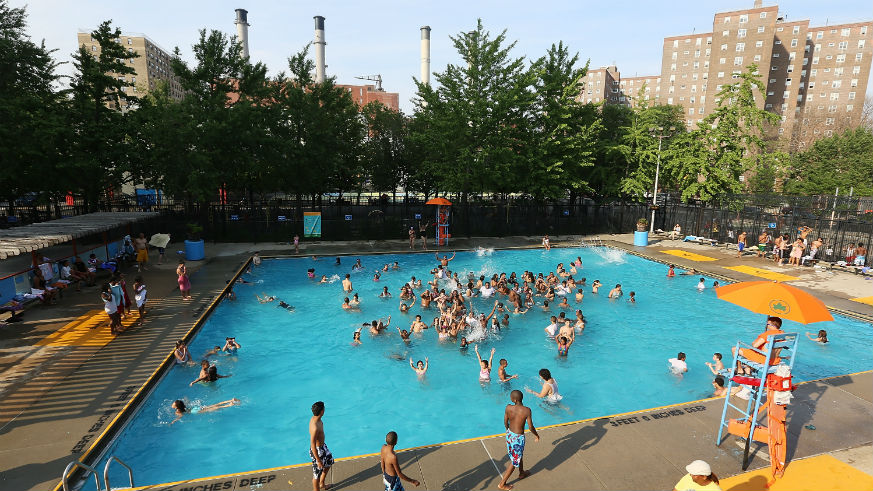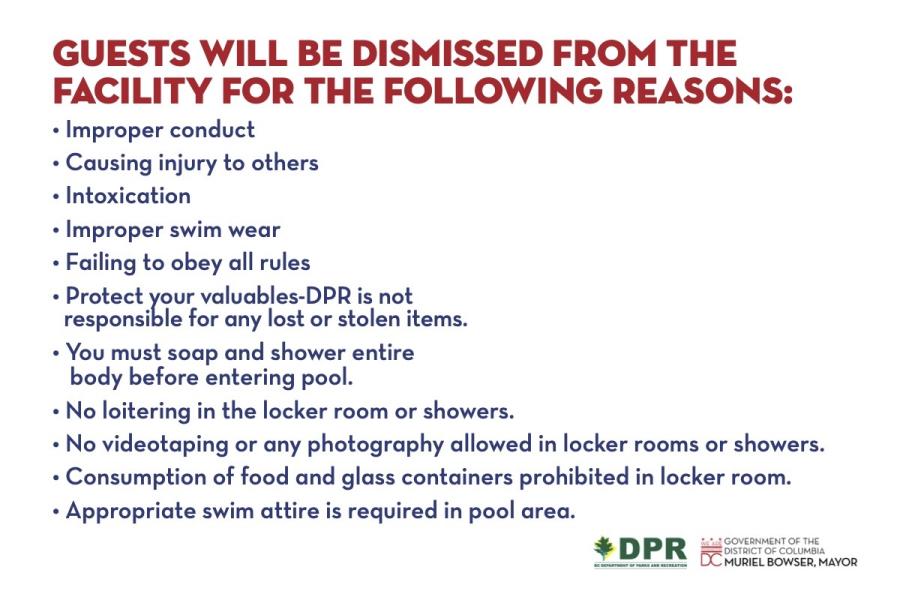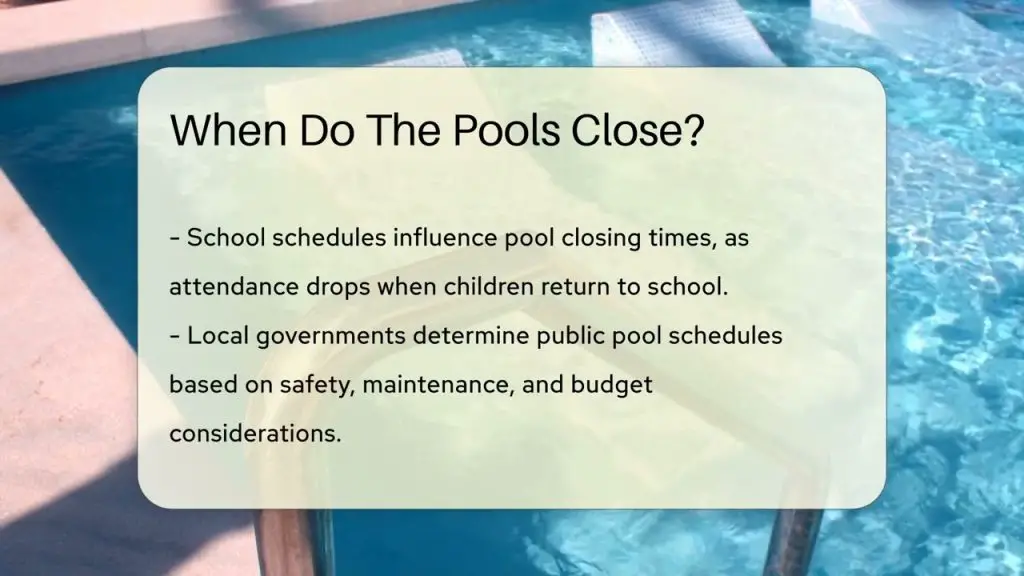Pools typically close at the end of the summer season or during colder months. As the summer season comes to a close and the weather begins to cool down, many people wonder when pools will close for the year.
It’s important to know the specific dates and times when pools close to plan the remaining pool days or find alternative activities. Pool closures usually occur at the end of the summer season, typically around September or early October. However, it’s worth noting that some pools may close earlier if the weather starts getting colder sooner.
In colder regions, pools often close even earlier, around August or even July. It’s always a good idea to check with your local pool or recreation center to find out the exact closing dates for the season.

Credit: www.metro.us
Importance Of Knowing Pool Closing Dates
Being aware of pool closing dates is crucial for effective maintenance and planning. It helps in avoiding unexpected closure and ensuring proper end-of-season maintenance.
Avoiding Unexpected Closure
Knowing when the pool closes allows individuals to schedule their last swims and pool activities before the closure date, thus avoiding disappointment and inconvenience due to unexpected closures.
Planning For End-of-season Maintenance
Understanding the pool closing schedule enables pool owners to plan and execute necessary end-of-season maintenance activities, such as cleaning, chemical treatments, and equipment winterization, to preserve the pool’s condition during the off-season.
Factors Influencing Pool Closing Dates
Factors influencing pool closing dates include the climate, weather patterns, and the type of pool cover used, as well as the preferences of pool owners. These variables determine when pools typically close, ensuring they remain well-maintained and protected during the off-season.
Factors Influencing Pool Closing Dates Climate and Weather Conditions When it comes to determining pool closing dates, climate and weather conditions play a significant role. In regions with harsh winters or extended periods of cold weather, pools typically close earlier to prevent damage from freezing temperatures. Conversely, in milder climates, where temperatures remain relatively stable, pools may stay open longer. Local Regulations and Guidelines Local regulations and guidelines also impact the timing of pool closures. Municipalities often enforce specific closing dates to ensure compliance with safety and health standards. These regulations may be influenced by factors such as the availability of lifeguards, water quality requirements, and zoning ordinances. In addition to municipal regulations, homeowner association (HOA) rules and neighborhood covenants may dictate the pool closing schedule for residential communities. These guidelines are intended to promote uniformity and safety among all pool owners within the neighborhood. In conclusion, understanding the factors that influence pool closing dates is crucial for pool owners to ensure compliance with local regulations and to protect their investment in their swimming pool.
Typical Pool Closing Procedures
When it’s time to close your pool for the season, following typical pool closing procedures is essential for maintaining its longevity. With proper care, your pool can remain in peak condition for years to come.
Winterizing The Pool Equipment
- Clean and brush the pool thoroughly.
- Lower the water level below the skimmer.
- Drain all the water from the pump, filter, and heater.
Chemical Balancing For Winter Storage
- Adjust the pH level to 7.2-7.6.
- Add winterizing chemicals to prevent algae growth.
- Shock the pool with chlorine to kill bacteria.
Common Mistakes To Avoid During Pool Closing
When it comes to closing your pool for the winter season, there are several common mistakes that pool owners often make. Avoiding these mistakes is crucial to ensure that your pool is properly closed and protected during the colder months. In this section, we will discuss two of the most common mistakes to avoid during pool closing: neglecting proper drainage and forgetting to adjust chemical levels.
Neglecting Proper Drainage
One of the most important steps in closing your pool is to ensure that all excess water is drained properly. Neglecting this step can lead to serious issues, such as damage to the pool structure or freezing and cracking of pipes. To avoid such problems, it is essential to follow these drainage tips:
- Start by lowering the water level in the pool to about 4-6 inches below the skimmer.
- Use a submersible pump to remove any remaining water from the pool and ensure that the pump is working properly.
- Drain all water from the pool’s plumbing lines, including the filter, pump, and heater, to prevent freezing and damage.
- Lastly, make sure that all drains and plugs are properly closed to prevent any water from entering the pool during the winter.
By following these drainage tips, you can ensure that your pool is properly prepared for the winter season and avoid any potential damage caused by freezing or excess water.
Forgetting To Adjust Chemical Levels
Another crucial mistake often made during pool closing is forgetting to adjust the chemical levels. Failing to do so can result in unbalanced water and the growth of unhealthy bacteria and algae over the winter months. To ensure that your pool water remains clean and clear, remember to:
- Test the water for pH, alkalinity, and sanitizer levels using a reliable pool water testing kit.
- Adjust the pH and alkalinity levels to the recommended range (pH: 7.2-7.6, alkalinity: 80-120 ppm) using appropriate chemicals.
- Shock the pool with a chlorine-based shock treatment to eliminate any contaminants.
- Lastly, add a winterizing algaecide to prevent the growth of algae during the winter months.
By taking these necessary steps to adjust the chemical levels, you can ensure that your pool water remains balanced and free from any potential issues when it comes time to reopen your pool in the spring.
Tips For Extending The Pool Season
Are you a pool owner who dreads the end of swimming season? Don’t worry, we’ve got you covered. With a few simple tips and tricks, you can extend the pool season and enjoy those refreshing dips in the water for longer. In this article, we’ll explore some effective ways to keep your pool open well beyond the usual closing time. Read on to discover how investing in pool heaters and using pool covers can help you make the most of your pool throughout the year.
Investing In Pool Heaters
One of the best investments you can make to extend your pool season is to install a pool heater. With a pool heater, you can regulate the temperature of your pool water and enjoy swimming even when the weather cools down. There are several types of pool heaters available in the market, including gas, electric, and solar-powered options. Each has its own benefits and considerations, so choose the one that best suits your needs and budget.
Gas heaters are known for their quick heating capabilities, making them an ideal choice for those who want to heat their pools on demand. Electric heaters, on the other hand, are more energy-efficient and provide a steady source of heat. If you are looking for a greener option, consider a solar-powered heater. These harness the power of the sun to warm up your pool and are highly cost-effective in the long run.
Using Pool Covers Effectively
Another effective way to extend your pool season is by using pool covers. These handy accessories help retain the heat in your pool, prevent evaporation, and keep debris out. With a pool cover, you can significantly reduce heat loss during cold nights and conserve water by minimizing evaporation.
When using a pool cover, make sure it fits securely and snugly over your pool. This will prevent any gaps through which heat might escape. Additionally, consider using a thermal pool cover, which is specifically designed to trap heat and maintain the temperature of the water. By using pool covers effectively, you can extend your swimming season by several weeks or even months, depending on your location.
Remember to regularly clean and maintain your pool cover to maximize its effectiveness. Remove any leaves or debris that accumulate on the surface and ensure that the cover is free from tears or damage. A well-maintained pool cover will not only extend your pool season but also protect your pool from harmful elements, saving you time and money on maintenance and repairs.
By investing in pool heaters and using pool covers effectively, you can extend your pool season and enjoy swimming for longer periods of time. Whether you prefer a warm dip in the water or want to take advantage of that crisp autumn weather, these tips will help you make the most of your pool throughout the year. So, what are you waiting for? Start planning your extended pool season today!

Credit: www.twincities.com
Pool Closing Services Vs. Diy
Discover the benefits of Professional Pool Closing Services compared to DIY methods. Learn the optimal timing for closing your pool.
Cost Comparison Pros and Cons of Each Approach In deciding between pool closing services or DIY, cost is a primary consideration. Pool Closing Services: – Cost: Average cost between $200-$500. – Pros: Professional handling, time-saving. – Cons: Higher expense, scheduling dependency. DIY: – Cost: DIY kits cost around $50-$100. – Pros: Cost-effective, hands-on experience. – Cons: Time-consuming, potential for errors. When it comes to closing your pool, weigh the costs and benefits of each approach.
Community Pool Closing Dates
In the quintessential community setting, the closing dates for the shared pool evoke a sense of togetherness. Understanding these dates is vital for residents. Let’s delve into how following the HOA regulations and pooling resources for maintenance play a crucial role in the closure of community pools. If you want to know When do pools open?
Following Hoa Regulations
H3 headings must be in HTML syntax. Community pool closing dates are usually determined by the regulations set forth by the Homeowners’ Association (HOA). Strict adherence to these regulations ensures the smooth and efficient operation of the pool facilities. It’s essential for all residents to be aware of the specific closing dates and the reasons behind them. Weather conditions, scheduled maintenance, and routine inspections may all factor into these decisions.
Pooling Resources For Maintenance
Effective maintenance is crucial for keeping the community pool in top condition and plays a significant role in determining the closing dates. Pooling resources for maintenance includes scheduling regular checks to ensure the pool meets safety standards. Moreover, collaborative efforts in cleaning and repair tasks are essential for extending the lifespan of the pool and ensuring an enjoyable experience for residents.
Preparing For Pool Reopening
As the pool season draws to a close, it’s important to start preparing for the pool reopening. Proper maintenance during the offseason can help ensure that your pool is in top condition when it’s time to open it again. From cleaning and inspection to scheduling maintenance services, there are several key steps to take in order to get your pool ready for the next season.
Cleaning And Inspection Checklist
Thorough cleaning and regular inspection are essential for maintaining a pool’s functionality and safety. Here’s a simple checklist to guide you through the process:
- Remove debris: Clear the pool of leaves, twigs, and other debris using a skimmer or leaf net.
- Brush and vacuum: Scrub the pool walls and vacuum the floor to remove any algae or dirt buildup.
- Check for leaks: Inspect the pool, pump, and filtration system for any signs of leaks or damage.
- Test water chemistry: Check the pH, chlorine levels, and total alkalinity to ensure the water is balanced.
Scheduling Pool Maintenance Services
How to maintain a pool? Professional pool maintenance services can help ensure that your pool is in optimal condition for the next season. Here are a few steps to consider when scheduling maintenance services:
- Book a professional inspection: Schedule a thorough inspection of your pool by a qualified technician to identify any potential issues.
- Plan for repairs: Address any necessary repairs or upgrades during the offseason to prevent delays when reopening the pool.
- Set a maintenance schedule: Establish a regular maintenance schedule for the upcoming season to keep your pool in top condition.

Credit: dpr.dc.gov
Conclusion
As the summer season winds down, pools start to close for maintenance and safety reasons. So, ensure you know the closing dates in your area to plan your final pool days. Enjoy the remaining swim time and make the most of your pool experience before it closes!





